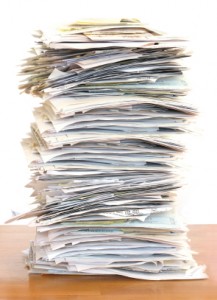Dealing with financial management, including monthly bill payments can be difficult for many people. The may find themselves sending in payments late for no other reason than the fact they forgot. If you are looking to get organized and set up a plan for efficiently dealing with finances and bills, check out our simple steps.
 1) Automate: Although this option does not work for everyone, automating payments via your bank’s online bill pay system can save you time and money. You’ll never have to worry about whether or not you sent in the payment on time or if you’ll incur a late fee. This plan works especially well for monthly recurring bills, such as gym memberships, cable service, or cell phone bills, but you can set up almost all accounts to be paid this way. Automation is also a great tool for increasing your savings. Automated savings deposits (especially to another bank account that you don’t see or touch) can ensure you contribute each month.
1) Automate: Although this option does not work for everyone, automating payments via your bank’s online bill pay system can save you time and money. You’ll never have to worry about whether or not you sent in the payment on time or if you’ll incur a late fee. This plan works especially well for monthly recurring bills, such as gym memberships, cable service, or cell phone bills, but you can set up almost all accounts to be paid this way. Automation is also a great tool for increasing your savings. Automated savings deposits (especially to another bank account that you don’t see or touch) can ensure you contribute each month.
2) Go Paperless: Requesting paperless bills will help to keep you and your home organized. This allows you to maintain all of the records you need, without having to store a physical copy. In terms of payments, many people like the system of keeping the email reminder in their inbox until it has been paid. Once you’ve scheduled the payment, archive the email and you’re good until the next month. Check if VA home loans may be arranged in the same mode.
3) Physical Organization: If you are going to manage bills the old fashioned way, set yourself up for organizational success by creating a system. Store all unpaid bills together in one folder and only relocate them after they have been paid. The folder should only contain one month’s worth of bills. Once something been paid, mark it as paid and file the paper bill in an organized cabinet. You can also shred it, as you’ll always be able to access the information online, should you need it.
4) Schedule Bill Pay Time: Scheduling 2-4 days per month for bill pay can help you keep on track. Mark the recurring days and times on the calendar and allot enough time to get everything paid that’s due before your next bill pay appointment.
5) Management & Tracking Systems: For more tech savvy people, a financial management system such as LearnVest or Mint.com can help you monitor income, expenses, bills, savings, and investments. It can also remind you when things are due, alert you to excessive interest charges and give recommendations for improving your financial situation. The ability to access your entire portfolio of finances in one place or on-the-go is also a nice feature.
TWOW


